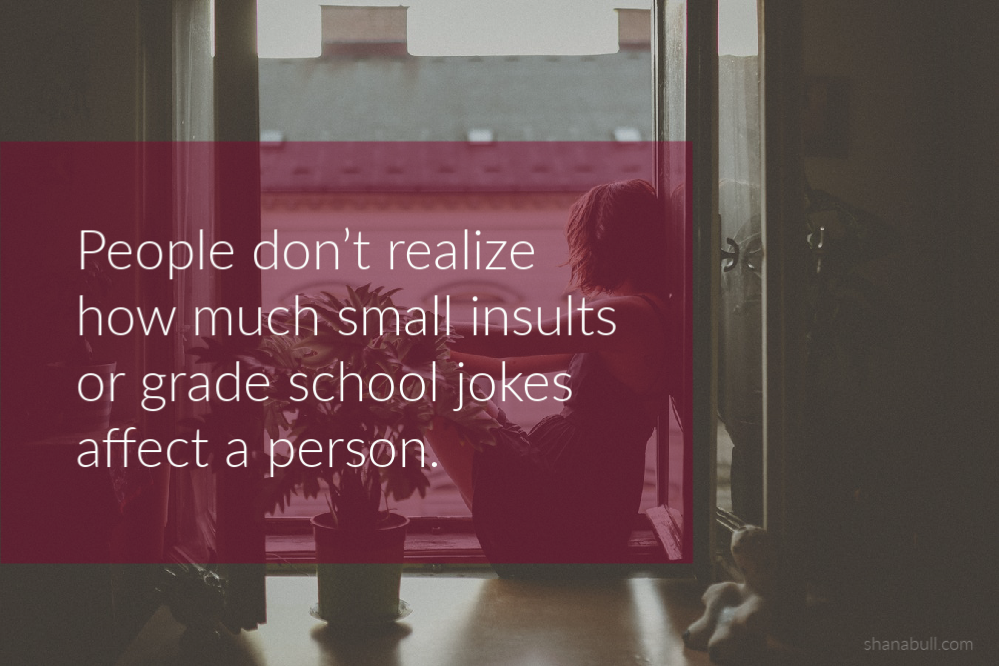I Wasn’t Bullied As A Child, But I Got Made Fun Of A Lot
I have a confession to make: I am just under 5’2”. Many of my online friends don't even realize how short I am, and wind up saying something when they first see me about how they didn't picture me being short, or something along that line. In general, I don't think about it, maybe because I work from home most the time, or maybe because I hang out with a two-and-a-half-year-old during the majority of my non-work hours. Either way, it's only something that comes up occasionally. But when it does, it is my least favorite topic in the entire world.
Why I hate being short
I know everybody has some type of complex that they deal with internally. And many people would probably say that while I may be short, at least I’m Intelligent, or have good hair or cool tattoos. I am definitely thankful for the things that I have in my life, but I have always had an issue with being short. It started in middle school when boys used to call me “small fry” or “bug," etc. Throughout high school, many of my good friends were really tall, and even one of my best friends would call out about how small my hands were.
Fast forward almost 20 years later, and (as I mentioned earlier) people still comment on how short I am. I never really put that much thought into why I hated it so much. I would just try to push it out of my mind as quickly as possible and leave the conversation. It wasn't until a recent bachelorette party with friends from high school that I realized how much I was bothered by it. Not by the fact that I’m short, but by having been picked on because of it my entire life. No one picked on me during the bachelorette party, but we did talk about past experiences a lot. Which got me thinking about the past.
When I got home the day after the Calistoga spa day and slumber party, I reflected on my friendships over the years and how it has affected me throughout adulthood. I spent the morning hungover in bed, reflecting and texting my best friend who lives in Seattle.
My epiphany through text:
The height thing in retrospect isn’t that big of a deal with one person — but it’s kind of like a drop in the bucket. One person says something about me not being able to reach something here, and then another person puts their arm on my head over there. And everything as a whole makes me feel less of a person. Like I can’t be taken seriously because I’m short. You know?
Being the butt of a joke is a big deal – and we don’t even realize it
I'm not talking about being bullied by one kid or group of kids (you know, the mean girls). I'm talking about small comments or jokes that are thrown around – by friends, peers, adults, etc. The problem is that people don’t realize how much small insults or high school/middle school jokes affect a person. I mean, I didn’t realize it until very recently, but I know it has stayed with me my entire life.
In the past few weeks, I have spent a lot of time thinking about the concept of intent and impact. For the most part, jokes between friends are not intended to be harmful, but that doesn’t make them any less hurtful. It’s not bullying, but that doesn’t mean it’s okay. A book I am currently reading “Well, That Escalated Quickly: Memoirs and Mistakes of an Accidental Activist” by Franchesca Ramsey talks about how it may not be your intent to step on someone's foot while walking, BUT you should still say “I am sorry.” Many times the jokes or comments go almost unnoticed. In the past, I remember responding with humor or defensiveness.
I’ve gotten angry, I’ve left the room, and I’ve felt embarrassed. BUT not once have I really explained to people how I felt, possibly because I didn’t even realize how much I hurt until now. The idea of being short – or different in any way – can make you think you are somehow “less than” others. Like no one will take you seriously, so why bother trying. Your brain has the ability to perpetuate teasing when you don’t feel good about yourself.
Speak up when you or someone you know is the butt of a joke
Letting people know that being joked about is something that hurts is the first step to stopping it. I know that is much easier said than done, especially if you believe what others are saying to you.
“Shame is not a catalyst for change; it is a paralytic. Anyone who has ever carried extreme personal shame knows this. Shame doesn’t make you stronger, nor does it help you to grow, or to be healthy, or to be sane. It keeps you in one place, very, very still.” - xo jane writer, Lesley Kinzel
It’s even worse if the person making the joke or comment is a person in a position of authority (like an adult, or even a friend).
Here are some recommendations for what to do if YOU or your kids are the butt of a joke:
Make a plan for how to respond. I recently listened to a Marie Forleo podcast episode on “How to Change Your Life” with small steps and it provided me with simple action items to start some changes right away! The last step that she and Todd Herman discussed was writing out your response to getting told “no” (no to getting a job you want, or anything that you may be excited about). Writing down your response allows you get out your feelings so you don’t have to stress about what happens when you’re put in that position (and end up saying something you don’t mean, or freezing up and say nothing) because you already have it written.
- Similarly, you should write a response for when you are the butt of a joke. This way you are prepared to reply, and it allows you to not focus on being offended or to trip on your words because you’re embarrassed or angry. This practice can work for yourself or for your kids. Help them figure out what they’d like to say.
Remind yourself that you are not just the sum of what you look like on the outside. Feeling like you’re not good enough affects how you look at everyday life. Simple affirmations help.
Also, make sure those around you know you are proud of them. It's a simple gesture, it makes you feel good, and it makes them feel good.
Talk to close friends and let them know how you feel. Ask them to say something if someone else makes a joke. This way you don’t feel like you’re repeating yourself over and over again. Having someone else on your side helps to build confidence, too.
Share links to your favorite articles or podcasts that talk about social justice. Our world is changing and people are becoming more aware of the effect that words have on people. There is A LOT being shared on social media, and yes…much of it is negative news or not particularly prevalent to my life or the things I care about. But occasionally a friend shares an article that genuinely helps me learn something I didn’t know about (like one my friend Jana shared – Using Homophobic and Transphobic Phrases – about the origins of phrases people use every day and how the use of them leads to people thinking gay people are somehow “less than”).
Be more aware of your own words. If you don’t like when people make fun of you, take a look at your own self and ask yourself if you are making snide comments or jokes about others. Remember that such comments are not always easy to spot because it’s so ingrained in ourselves. If you find that you are making jokes at others’ expense, try to find a different phrase for what your intention is.
If you have done or said something that has offended someone else, it doesn’t matter if it was yesterday or years ago. Apologize for it. Let them know that you realize your mistake and you simply want to say sorry. Apologies help others realize their words can hurt. I know this all too well. I have a sarcastic streak that can come across as mean sometimes and I am working on it because I have hurt people I love.
Pay attention to what types of jokes people say about you. Obviously things like being short or other traits causing appearance-oriented quips can’t be changed. But if a friend constantly makes jokes about you being late, that could be her passive aggressive way of letting you know that it bothers her. So think about the context of the joke and if it is something that you need to have a longer conversation about.
Being woke can help incite change
As silly as I feel for using the word WOKE in a sentence, it is true. Being aware of social issues and speaking openly about positivity can lead to an overall shift in mindset. This is even more important in the Trump era, in which the leader of the United States is himself a bully. We need to make sure that we raise our children with empathy and compassion for others. Because helping others is how we are all going to better ourselves.
I know that simply writing this article and talking about how feeling short makes me feel like I am not taken seriously helps ME feel better about myself. I hope reading this can help you, or someone you love as well. <3




